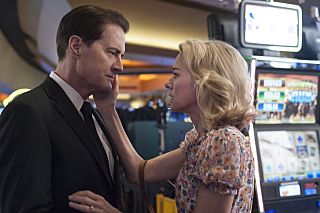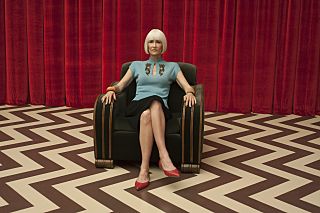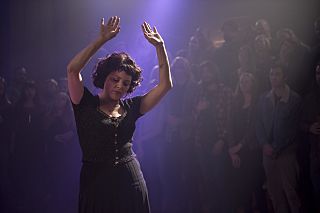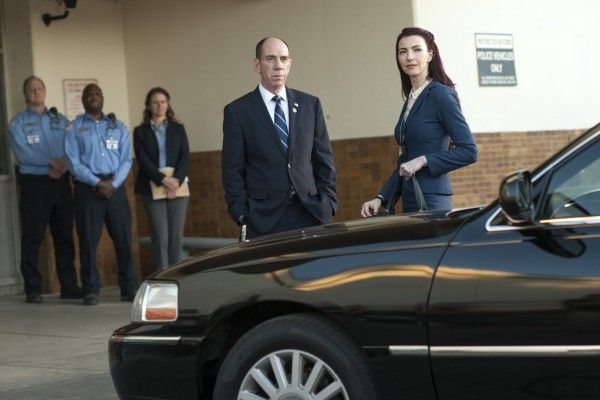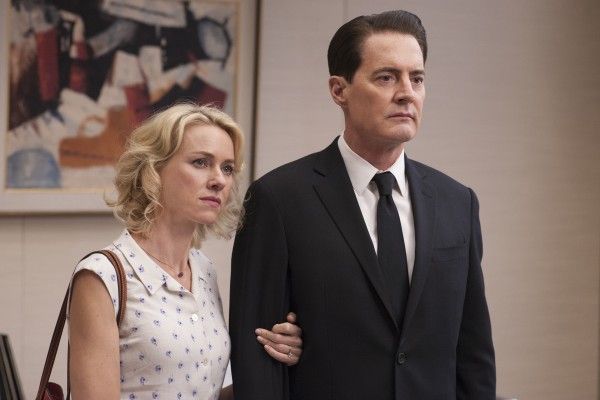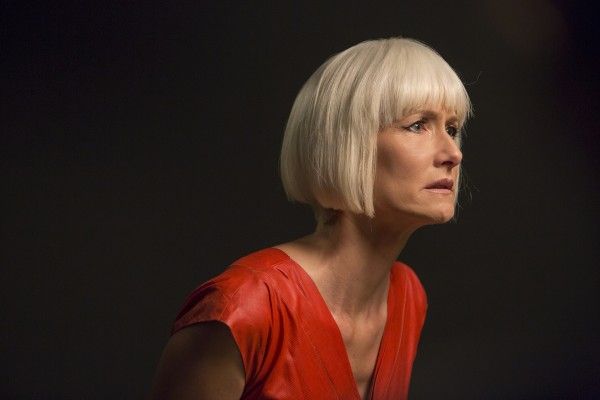He's back.
After fifteen episodes of Kyle MacLachlan playing a doddering version of Dale Cooper retrofitted into the life of an insurance salesman named Dougie, the more familiarly gung-ho, complimentary Agent Cooper awoke from a hospital bed in Nevada. And in answering the looming question of whether or not the original Cooper would ever arrive in Twin Peaks: The Return, David Lynch appears neither flashy nor indecisive when Cooper's sharp, direct tone hits your ear drums again. The moment felt natural and unburdened, as if waking up from the first restful sleep you've had in weeks.
I'm getting ahead of myself. "Part 16" was an episode easy to get wrapped up in. It's easily one of the most eventful episodes thus far and it presents an abundance of base narrative pleasures, at the very least. The ominous and literally explosive opening began with a familiar drive through empty, dark roads and ended with Richard Horne violently evaporating into the ether. Lynch's use of effects in Richard's death - or was it? - was especially striking. There are genuinely no concise words for what happens to him, but Mr. C seems to know that he is gone and bids farewell. Only poor, drugged-up Jerry was there to bare witness.
There were four other moments of violence in "Part 16" and each one seemed to serve as an disruption of bigger events. Hutch and Chantal wasted away in that van, sustained on knock-off Cheetos, waiting to enact their plan to kill Dougie. By waiting around and refusing to move their van when asked, in front of a cadre of looming FBI agents no less, they invite darkness just as mean and consuming as that which they carry around. Like Richard's fireworks-laden demise, the killing of Chantal and Hutch feeds into a feeling of a penultimate chapter closing that's built up especially high in "Part 16." That's clearly on purpose and wondering if that says anything about what will happen in the finale is an invitation to delirium.
The death of Diane also seemed to signal the tying up of loose strands of story, but also allowed for another dump of backstory. Here, she reveals that when she last saw Cooper, he grilled her on information about the inner-workings at the FBI before raping her. In most of these scenes, the backstory doesn't really stick out. The information comes out indistinctly and does nothing more then spackle up perceived holes in the story. For whatever the basic intrigue of how she describes her last night with Cooper, it's nowhere near as interesting as her sudden attempted shooting of Gordon and the Blue Rose unit, which led her back to the Black Lodge.
Did Diane want revenge on Cooper and the FBI? Who is she on the phone with now? There's a good chance we'll never know these things. In the Black Lodge, Diane is told she's been manufactured, which could be a reference to the fact that she is a character invented by Lynch and Mark Frost or her being controlled by outside sources. She evaporates into a "seed," which suggests that life will eventually come bursting forth from that. And yet in this scene, it's not the feeling of life but death that seems to come from her awkward dismantling and evaporating into a small ball bearing.
In comparison, Cooper's first communique to the Black Lodge felt like James Bond checking back in with Q. For all the grotesque and wayward detours that Lynch has driven down over the last sixteen episodes, he treats Cooper's awakening with the rousing sense of joy and anticipation that the moment deserves without ever overplaying his hand. It's in the way he immediately makes plans to get to Spokane, the way he thanks Bushnell and the Mitchum brothers with sincerity and convincing humbleness, and how he knows how to convince the doctor to let him go. It's even in the hero's big goodbye he gives to Janey-E and Sonny Jim, which echoed a number of famed Westerns, most notably Shane. And yet, Lynch laces the moment with a painful moment of desperation and confusion: before heading to Spokane, he tells Dougie's family that he is not Dougie, and offers no explanation before abandoning them in the Mitchums' casino.
There's heartbreak in watching Janey-E grapple with this bewildering statement and Lynch seems dedicated to showing that the awakening of Cooper at the cost of Dougie's destruction isn't without its ugly outcomes. Blissful freedom must always come at the cost of panic, anxiety, and confusion, as it did in the final sequence following Eddie Vedder's lovely "Out of Sand." As Audrey and Charlie (Sherilyn Fenn and Clark Middleton) finally arrived at the Bang Bang Club, the band cues up "Audrey's Dance," and Fenn takes to the floor.Watching Fenn eloquently shift, shamble, and contort to the music is a moment of grace amongst many violent eruptions. And then, right at the end, the shock of Audrey in a white room, screaming at herself in the mirror.
If I had to guess, I would say that arriving at the Bang Bang caused Fenn to wake up from some dream-state but in the aftermath of so many surprises that change the course of what the finale might bring, there's less of an incentive to guess what will happen next and every reason to just brace for the final two hours next weekend.
Rating: ★★★★★
(Editor's Note: Taking into account that next week's finale is a two-parter, next week's recap will post mid-day Monday rather than Sunday evening.)


